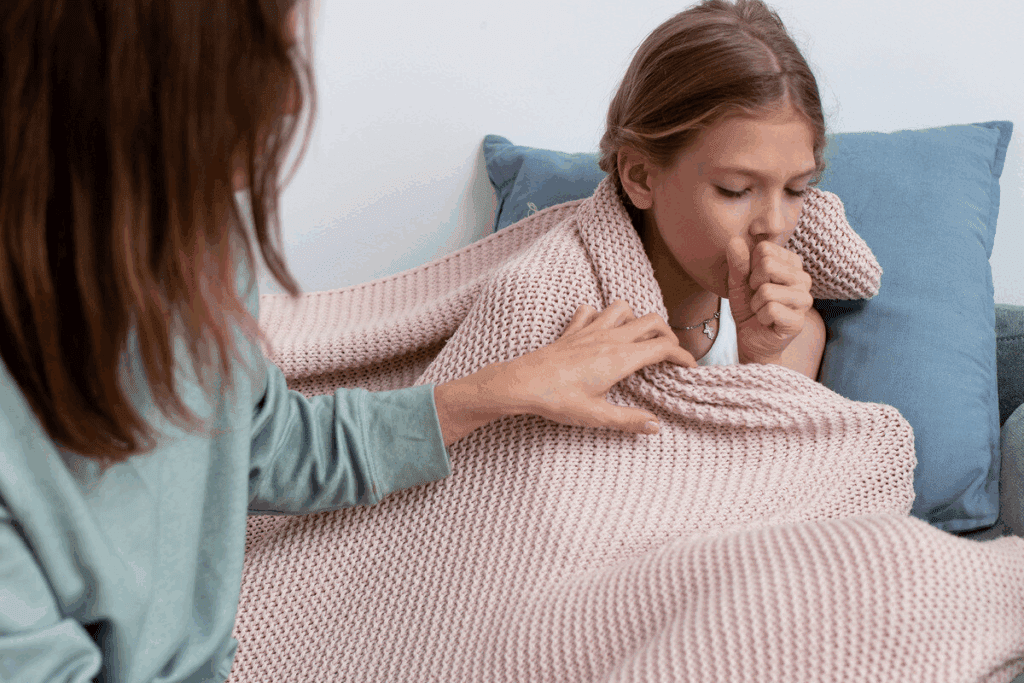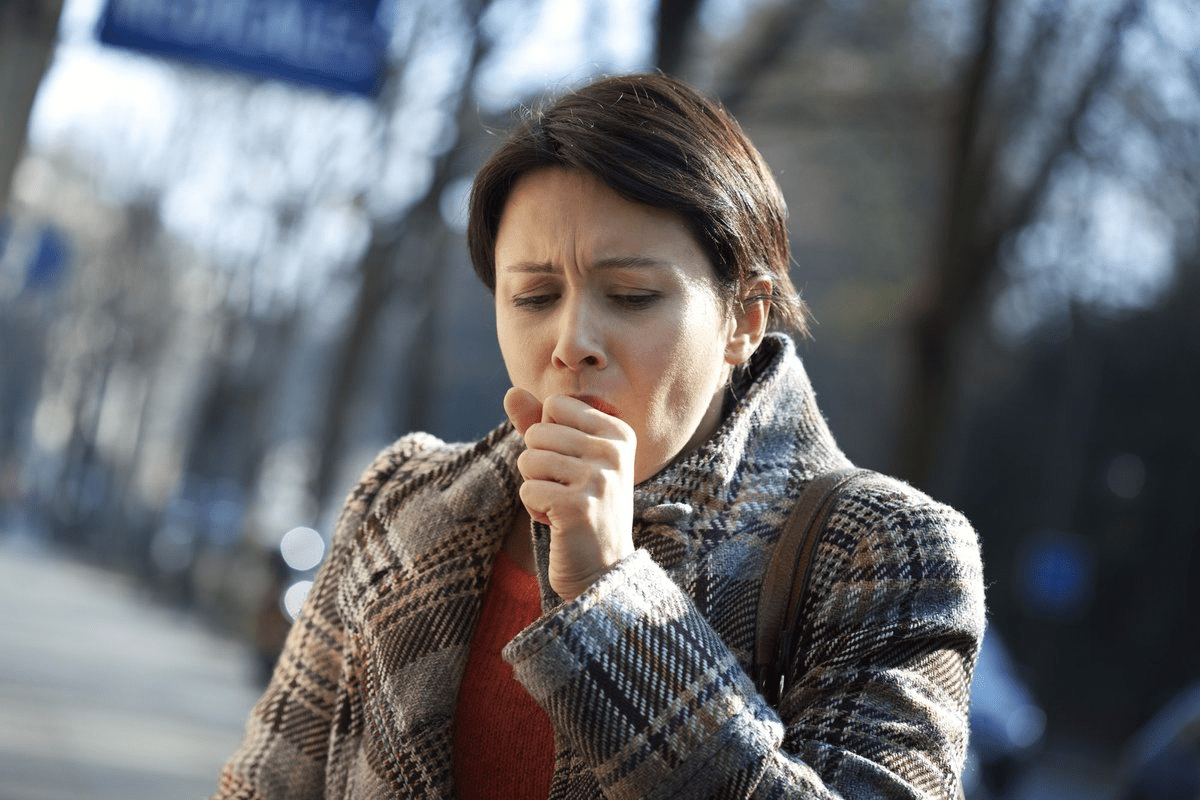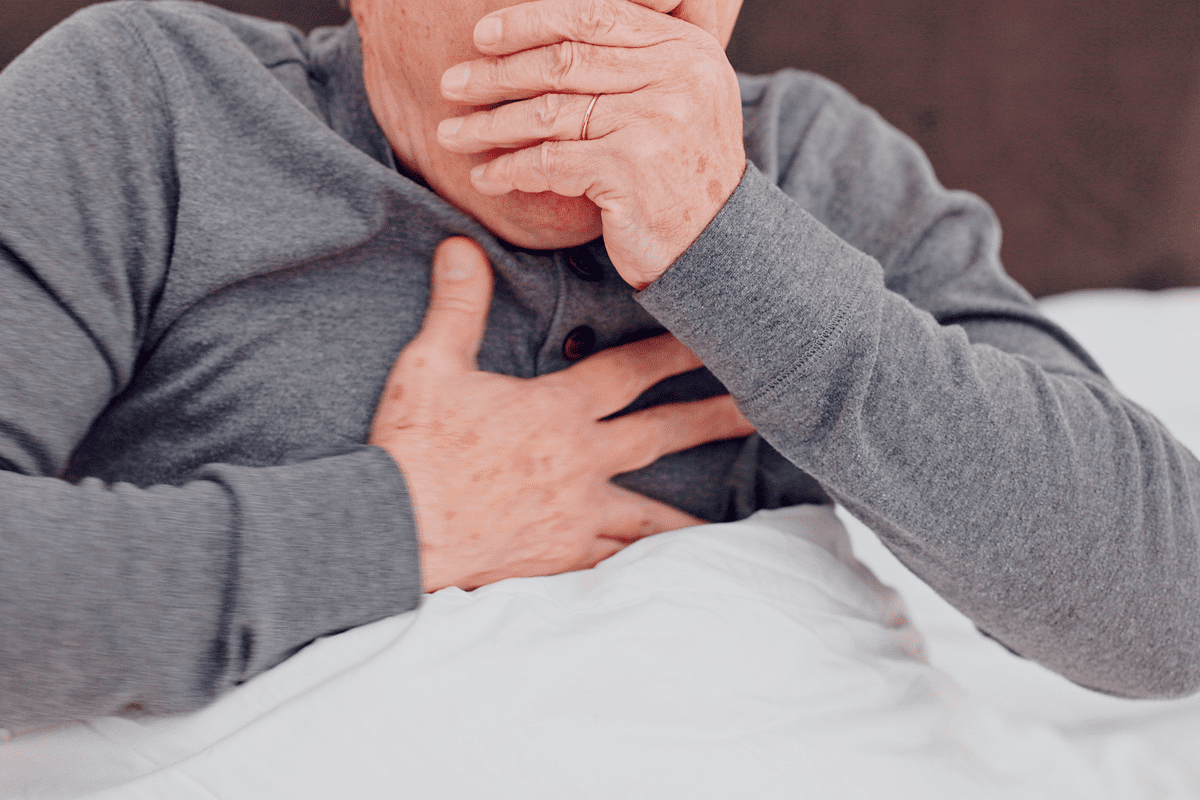Last Updated on November 27, 2025 by Ugurkan Demir

Coughing while eating is a common problem that many people face. It can be caused by a variety of issues, from mild to serious.
At Liv Hospital, we know how upsetting postprandial cough can be. Our team is focused on finding the real reason behind this symptom. We offer a patient-centered approach and have experienced teams ready to help.
Things like GERD, dysphagia, food allergies, and asthma can make you cough after eating. Knowing what causes it is key to solving the problem.
Why do I cough while eating? Learn about dysphagia (swallowing difficulties) and acid reflux as common culprits.

Coughing while eating is common and can be harmless or a sign of a health problem. To understand coughing during meals, we need to know the body’s processes and when it might mean something serious.
When we eat, food goes down the esophagus. Sometimes, food or stomach acid can irritate the throat and cause coughing. Research shows that GERD and acid reflux are common causes of coughing after eating. Stomach acid can reach the throat, causing irritation and coughing.
This coughing is the body’s way to protect the airway. But, if it happens a lot, it might mean there’s a bigger problem.
Not all coughing while eating is a worry. Sometimes, it’s just the body’s way of dealing with food in the airway. But, if it happens a lot, it could mean there’s an issue like dysphagia or an allergy. It’s important to know when coughing is normal and when it’s not.
Coughing while eating is more common than you might think. Studies and doctors have found that many people experience it. Things like what we eat and our health can make it more likely.

Coughing while eating might mean you have Gastroesophageal Reflux Disease (GERD). This is when stomach acid goes back up into the esophagus. GERD is a long-term issue that affects many people and can cause coughing after meals.
GERD happens when the lower esophageal sphincter (LES) doesn’t close right. This lets stomach acid flow back into the esophagus. This acid can irritate the esophagus and throat, causing coughing. Eating can make this worse because swallowing can push more acid up.
The cough from GERD comes from acid reflux reaching the upper airways. When stomach acid flows back, it can go into the lungs or cause a cough. This cough can be chronic and gets worse at night or after eating.
Not every cough is from GERD, but some signs point to it. These include:
Seeing a doctor is key to figuring out the cause of your cough.
Fixing GERD coughs means treating the GERD itself. This can include:
By tackling the GERD, you can stop the cough and live better.
Eating is usually a joy, but for those with dysphagia, it’s hard and uncomfortable. Dysphagia, or trouble swallowing, really affects a person’s life. It makes simple things hard.
About 4 percent of adults in the U.S. have dysphagia. It’s more common in people over 50. It can come from many things, like brain problems or blockages.
“Dysphagia is more than just swallowing trouble,” says Dr. [Last Name], a gastroenterology expert. “It needs a full approach to manage it well.” Knowing the causes and signs is key.
People with dysphagia might cough or gag while eating. This happens when food or liquids don’t go down right and go into the airway. This can cause problems like infections in the lungs.
Coughing can help clear the airway, but too much of it might mean there’s a bigger issue. It’s something to look into.
Handling coughs from dysphagia needs a few steps. Start with softer foods and thicker liquids. Also, eat smaller bites and chew slowly.
Knowing about dysphagia and its effects can help. It lets people take steps to reduce coughing and live better.
It’s important to know about food allergies to understand why we might cough after eating. Food allergies can start at any age and show up within 2 hours of eating the allergen. Symptoms can be mild or severe, like coughing, wheezing, and trouble breathing.
Some foods can make us cough, like nuts, shellfish, milk, eggs, fish, soy, and wheat. When we eat something we’re allergic to, our body fights it by releasing chemicals. This can cause a range of symptoms.
It’s important to tell the difference between allergy coughs and other types. Allergy coughs often come with other symptoms like itching, swelling, stomach pain, diarrhea, or trouble breathing.
Experts say,
“Allergic reactions can show up in many ways, and coughing is common. Finding out what you’re allergic to is the first step to feeling better.”
To deal with coughing from food allergies, we need to avoid the allergen, manage symptoms, and sometimes take medicine. For serious allergies, it’s key to have an EpiPen or other emergency meds with you.
Allergen | Common Symptoms | Management Strategies |
Nuts | Coughing, wheezing, skin rashes | Avoidance, reading labels carefully |
Milk | Coughing, digestive issues, skin rashes | Dairy-free alternatives, lactase supplements |
Shellfish | Coughing, swelling, abdominal pain | Avoidance, carrying emergency medication |
Asthma is a chronic condition that can make eating hard. Some foods, like those with sulfites, can cause coughing. Knowing what triggers asthma is key to feeling better.
Asthma can change how people eat. For some, just thinking about certain foods can start asthma symptoms. This is because of allergens or irritants in the food.
Sulfites are used in many foods, like dried fruits and wine. They can make asthma worse, causing coughing in people with the condition.
Foods with sulfites include dried fruits, processed meats, and some drinks. Knowing these foods can help people with asthma eat better.
To handle coughing during meals, avoid trigger foods and use medicine. Eating habits also play a role. Knowing which foods to avoid is important.
Food Category | Examples of High Sulfite Foods | Tips for Reduction |
Dried Fruits | Apricots, Apples, Raisins | Opt for fresh or frozen alternatives |
Processed Meats | Sausages, Bacon, Ham | Choose nitrate-free or freshly prepared options |
Beverages | Wine, Beer, Some Fruit Juices | Select sulfite-free or low-sulfite beverages |
Understanding asthma, food triggers, and sulfites helps manage symptoms. This can reduce coughing during meals.
When food or liquids go into the airway instead of the esophagus, it’s called aspiration. This can cause coughing during meals. Aspiration happens when something foreign goes into the lungs, which can be serious.
Aspiration occurs when food or liquids don’t go down the right way. They go into the trachea instead. This makes the body cough to get rid of the unwanted material.
Aspiration can lead to serious complications, such as aspiration pneumonia. Aspiration pneumonia is when something inhaled causes an infection in the lungs. It’s very dangerous, mainly for the elderly or those with weak immune systems.
Several things can make you more likely to aspirate, including:
Knowing these risk factors is important for preventing aspiration and its problems.
To prevent aspiration, you need to tackle the risk factors. For those with dysphagia, changing how you eat and doing swallowing therapy can help. Others might need to manage their neurological conditions or adjust their medications.
“Early recognition and management of aspiration risk factors are key to preventing complications,” says a medical expert. “By understanding the causes and taking proactive steps, individuals can significantly reduce their risk of aspiration and related coughing during meals.”
We suggest talking to a healthcare professional if you keep coughing while eating. They can give you specific advice and treatment.
Upper respiratory infections can cause inflammation and irritation. This can lead to coughing, often after eating. When we have an infection, our airways get inflamed and produce more mucus.
Infections can make our airways very inflamed and irritated. This can cause more mucus, making us cough more when eating. The irritation also makes our airways more sensitive, leading to coughs even without eating.
It’s important to tell the difference between temporary and chronic coughs from infections. Temporary coughs usually go away once the infection heals. But if the cough lasts, it might be a sign of a chronic problem that needs medical help.
Let’s look at the differences between temporary and chronic coughs:
Characteristics | Temporary Cough | Chronic Cough |
Duration | Less than 8 weeks | More than 8 weeks |
Cause | Usually due to an acute infection | Can be due to various factors, including chronic infections, allergies, or GERD |
Treatment | Often resolves on its own or with minimal treatment | May require specific treatment based on the underlying cause |
To treat coughs from infections, we need to tackle the infection itself. For viral infections, we focus on easing symptoms and reducing mucus. For bacterial infections, antibiotics might be needed.
Key treatment approaches include:
Understanding the cause of postprandial coughing and using the right treatment can help manage symptoms. This improves our quality of life.
Certain medications can make you cough while eating. This happens because they affect the throat and esophagus. These side effects can be uncomfortable and disrupt your daily life.
Many medications can irritate the throat and esophagus. This leads to coughing during or after meals. Here are some examples:
ACE inhibitors are known to cause coughing. This happens because they increase certain chemicals in the body. If you’re taking ACE inhibitors and coughing, talk to your doctor.
Medication Type | Primary Use | Potential Effect on Coughing |
ACE Inhibitors | Treat high blood pressure and heart failure | Can cause coughing due to increased bradykinin levels |
Beta Blockers | Manage high blood pressure and heart conditions | May contribute to respiratory symptoms indirectly |
Aspirin and NSAIDs | Relieve pain and reduce inflammation | Can cause esophageal and throat irritation with long-term use |
If you cough while eating and think it’s from your meds, talk to your doctor. They can check your health and meds. They might change your meds or find other treatments.
Managing side effects can be tough. But with the right help, you can find a solution. Always talk to a doctor before changing your meds.
There are many ways to stop coughing while eating. Changing what you eat and drink is key. These steps can help you cough less during meals.
Changing your diet can help you cough less. Stay away from foods that make you cough more.
Good eating habits are important to avoid coughing. Eat slowly, chew well, and don’t talk while eating.
Drinking enough water is key for a healthy throat. It helps prevent dry coughs by keeping your throat moist.
Hydration Tips | Benefits |
Drink at least 8 glasses of water a day | Maintains throat moisture, reducing cough risk |
Avoid caffeinated and carbonated beverages | Reduces irritation to the throat lining |
Consume hydrating foods like watermelon and cucumber | Contributes to overall hydration and throat health |
By making these changes, you can cough less while eating. This will make your meals more enjoyable.
If you’re coughing a lot while eating, it’s important to know when to see a doctor. This cough could mean there’s something serious going on. We’ll tell you when you should get medical help and what to expect at the doctor’s office.
Some symptoms with coughing while eating are serious and need a doctor’s visit. Look out for severe coughing or gagging, trouble breathing, chest pain, or fever. If your cough gets worse or you have other symptoms like unintentional weight loss or trouble swallowing, see a doctor right away.
Also, if you have asthma or GERD and your symptoms get worse or new ones appear, see your doctor. Keeping a symptom diary can help track your cough and other symptoms. This info is useful for your doctor.
At the doctor’s office, you’ll get a full check-up to find out why you’re coughing. First, you’ll talk about your symptoms. Your doctor will ask when they started, how often, and what makes them better or worse.
Then, a physical examination will look at your breathing and stomach area. Your doctor might listen to your lungs, check your throat, and examine your belly. Based on what they find, they might suggest more diagnostic testing.
Tests depend on what your doctor thinks might be causing your cough. You might get a barium swallow study to check how you swallow and your esophagus. Or, you might have an endoscopy to see inside your esophagus and stomach.
Other tests could be pulmonary function tests to check your lungs. Your doctor might also suggest ambulatory acid probe tests or esophageal manometry to look at your esophagus. These tests help your doctor figure out what’s wrong and how to fix it.
Managing coughing while eating needs a full plan. It must tackle the main reasons and use good prevention methods. Knowing what causes postprandial cough helps people cut down on coughing during meals. This improves their life quality a lot.
Handling prandial cough over time means making diet changes and eating habits better. Sometimes, medical help is needed. We talked about reasons like GERD, dysphagia, food allergies, and asthma. Finding the main cause of coughing is key.
Using the tips from this article can lower the chance of coughing while eating. This makes meals more enjoyable and comfortable. With the right steps and support, managing coughing during meals for the long term is possible.
Coughing when you eat can happen for many reasons. These include GERD, trouble swallowing, food allergies, and asthma. Knowing the cause is key to fixing the problem.
GERD can make you cough while eating. This happens when stomach acid goes back up into your esophagus. It irritates your throat and lungs. There are treatments for GERD coughing.
Dysphagia, or trouble swallowing, can cause coughing. This is because food or liquids might go into your lungs. To stop this, you need to fix your swallowing issues.
Yes, food allergies can make you cough while eating. Common culprits include peanuts, tree nuts, fish, shellfish, milk, eggs, wheat, and soy. Staying away from these foods can help manage your cough.
Asthma can make you cough while eating, mainly if certain foods or additives, like sulfites, set off your symptoms. To manage asthma cough, avoid triggers and follow your treatment plan.
Aspiration is when you breathe in food or liquids, which can lead to coughing, pneumonia, or other issues. It’s more common in people with dysphagia, neurological disorders, or certain medical conditions.
Yes, upper respiratory infections can cause coughing while eating, more so if the infection is severe or long-lasting. Treating the infection is the best approach.
Yes, some medications, like ACE inhibitors, can cause coughing as a side effect. Talking to your doctor can help find a better solution.
To cut down on coughing, avoid foods that trigger it, eat smaller meals, and choose soft, easy-to-swallow foods.
If you cough a lot while eating, have trouble swallowing, or notice other concerning symptoms, see a doctor. They can check your symptoms and suggest tests and treatments.
Your doctor will ask about your medical history, do a physical exam, and might suggest tests like endoscopy or swallow studies. These help find the cause of your coughing.
To manage coughing long-term, address any underlying conditions, make dietary changes, and adopt healthy eating habits. This can help reduce coughing and related problems.
Baugh, R. F., Archer, S. M., Mitchell, R. B., Rosenfeld, R. M., Amin, R.,侧. R., . . . Witsell, D. L. (2011). Clinical Practice Guideline: Tonsillectomy in Children. Otolaryngology—Head and Neck Surgery, 144(1 Suppl), S1-S30. Retrieved from https://journals.sagepub.com/doi/full/10.1177/0194599810389949
Subscribe to our e-newsletter to stay informed about the latest innovations in the world of health and exclusive offers!